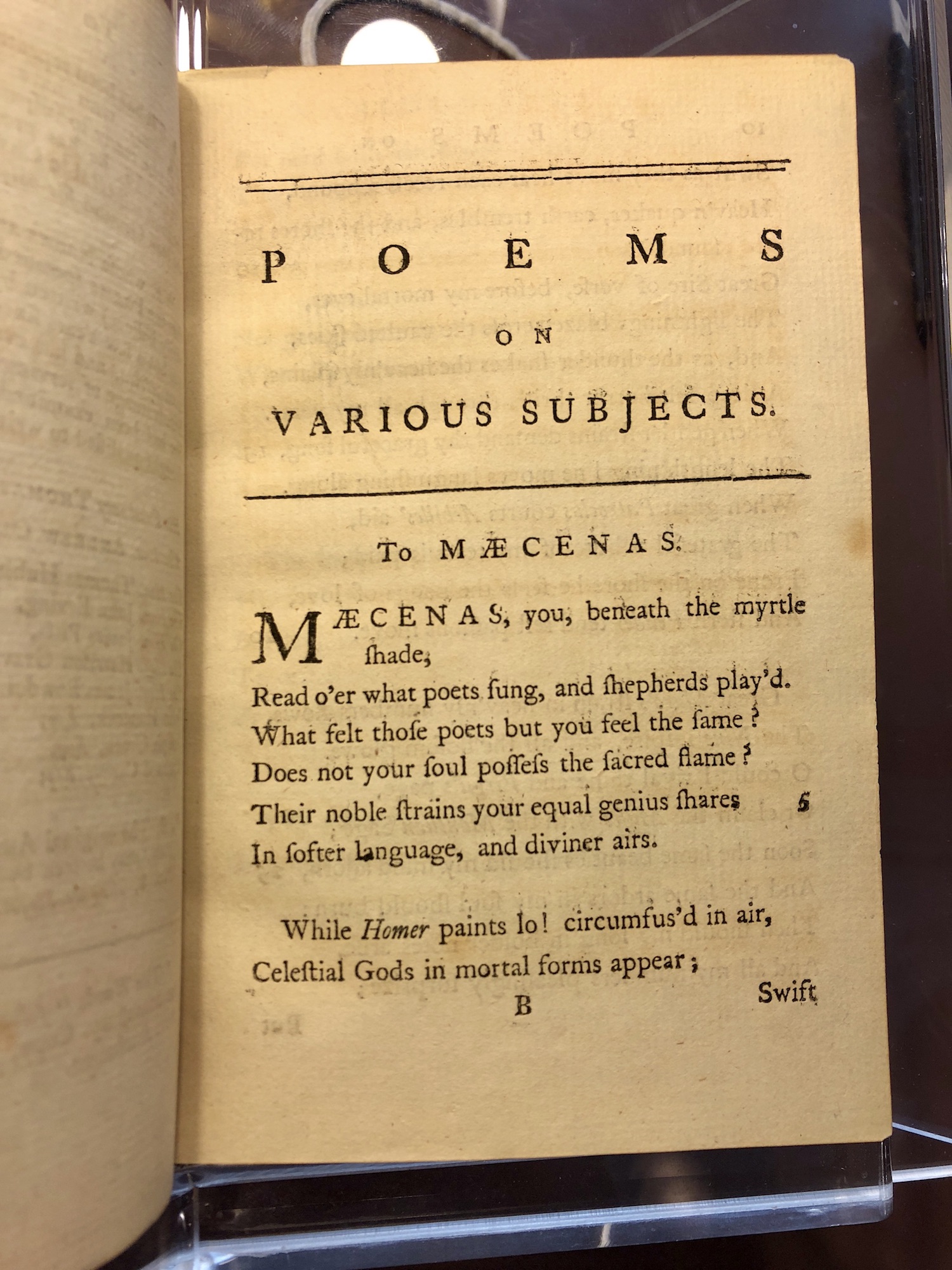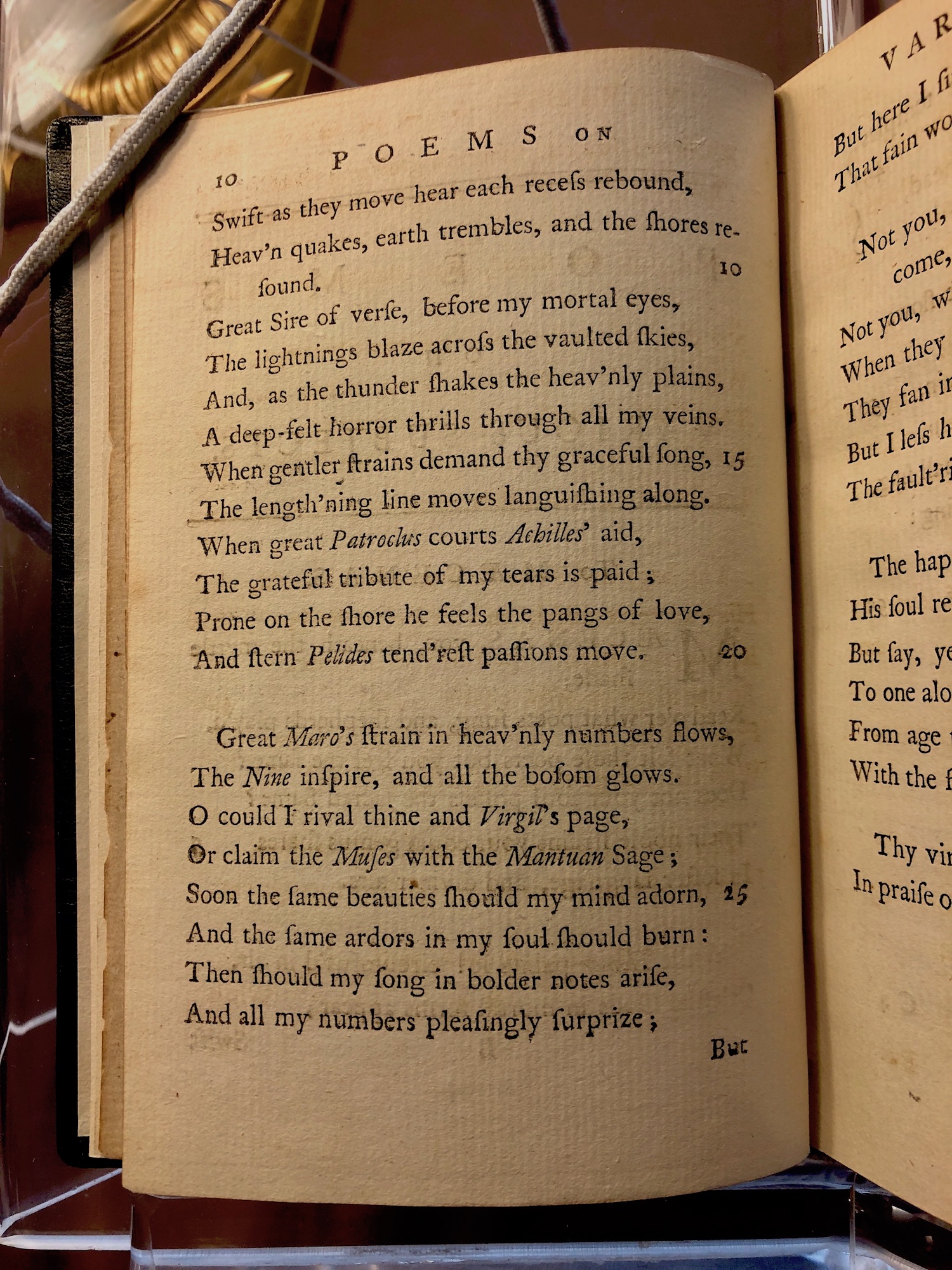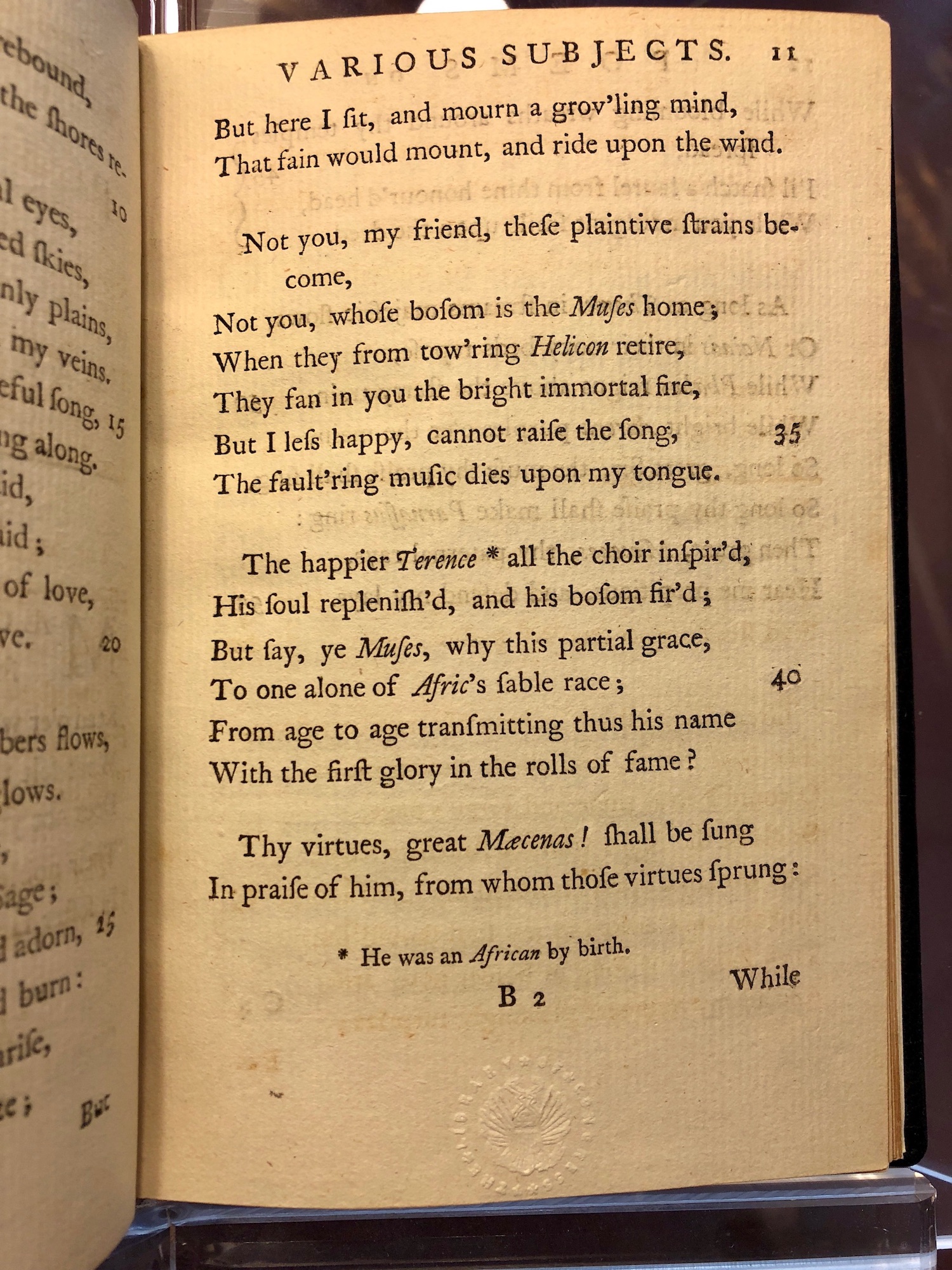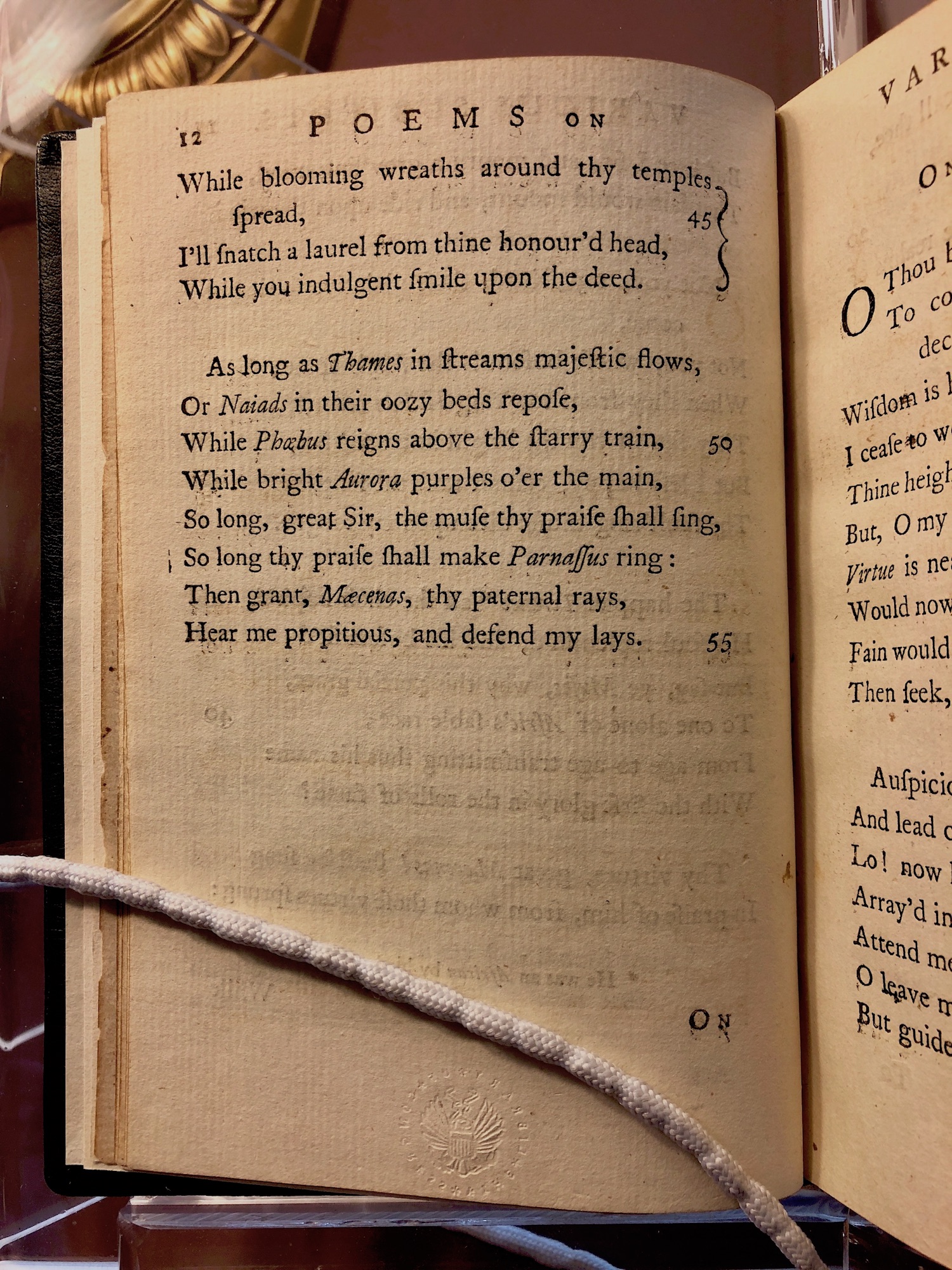"To Maecenas"
By
Phillis Wheatley
Transcription, correction, editorial commentary, and markup by Students of Marymount University, James West, Amy Ridderhof
9
TO MAECENAS.
1MAECENASMaecenasMaecenas Source: page from first edition of Wheatley's poemsMaecenas was the wealthy patron of classical Roman
poets Virgil and Horace, whom Wheatley draws on in complex ways. Wheatley's
poem "To Maecenas" opens her collection, which position gives it a powerful
significance as she claims the right to speak within this tradition. Like Horace's Odes to Maecenas, Wheatley's offers praise to her patron,
but does so in ways that are fraught with the equivocalities of being an
enslaved African working within the languge and culture of the colonial master. For a deeper
reading of "To Maecenas," see Paula Bennett's journal article, "Phillis
Wheatley's Vocation and the Paradox of the 'Afric Muse.'" Following other
scholars, Bennett identifies Wheatley's poet-patron as Mather Byles, one of the
signatories verifying her authorship. The image included here shows the
attestation to the public, included in the 1773 edition of Wheatley's poems,
certifying that they were indeed written by "PHILLIS, a young Negro Girl, who
was but a few Years since, brought an uncultivated Barbarian from Africa,...and now is, under the Disadvantage of serving
as a Slave in a Family in [Boston]." Note Bales' name. - [TH], you, beneath the myrtle shade,
2Read o'er what poets sung, and shepherds play'd.
3What felt those poets but you feel the same?
4Does not your soul possess the sacred flame?
5Their noble strains your equal genius shares
6In softer language, and diviner airs.
7While HomerHomerHomerHomer is the ancient Greek poet of The
Oddyssey and The Illiad. - [TH] paints, lo!
circumfus'd in air,
8Celestial Gods in mortal forms appear;
10
9Swift as they move hear each recess rebound,
10Heav'n quakes, earth trembles, and the shores resound.
11Great Sire of verse, before my mortal eyes,
12The lightnings blaze across the vaulted skies,
13And, as the thunder shakes the heav'nly plains,
14A deep-felt horror thrills through all my veins.
15When gentler strains demand thy graceful song,
16The length'ning line moves languishing along.
17When great Patroclus courts Achilles' aidPatroclusPatroclus
Source: page from first edition of Wheatley's poemsMaecenas was the wealthy patron of classical Roman
poets Virgil and Horace, whom Wheatley draws on in complex ways. Wheatley's
poem "To Maecenas" opens her collection, which position gives it a powerful
significance as she claims the right to speak within this tradition. Like Horace's Odes to Maecenas, Wheatley's offers praise to her patron,
but does so in ways that are fraught with the equivocalities of being an
enslaved African working within the languge and culture of the colonial master. For a deeper
reading of "To Maecenas," see Paula Bennett's journal article, "Phillis
Wheatley's Vocation and the Paradox of the 'Afric Muse.'" Following other
scholars, Bennett identifies Wheatley's poet-patron as Mather Byles, one of the
signatories verifying her authorship. The image included here shows the
attestation to the public, included in the 1773 edition of Wheatley's poems,
certifying that they were indeed written by "PHILLIS, a young Negro Girl, who
was but a few Years since, brought an uncultivated Barbarian from Africa,...and now is, under the Disadvantage of serving
as a Slave in a Family in [Boston]." Note Bales' name. - [TH], you, beneath the myrtle shade,
2Read o'er what poets sung, and shepherds play'd.
3What felt those poets but you feel the same?
4Does not your soul possess the sacred flame?
5Their noble strains your equal genius shares
6In softer language, and diviner airs.
7While HomerHomerHomerHomer is the ancient Greek poet of The
Oddyssey and The Illiad. - [TH] paints, lo!
circumfus'd in air,
8Celestial Gods in mortal forms appear;
10
9Swift as they move hear each recess rebound,
10Heav'n quakes, earth trembles, and the shores resound.
11Great Sire of verse, before my mortal eyes,
12The lightnings blaze across the vaulted skies,
13And, as the thunder shakes the heav'nly plains,
14A deep-felt horror thrills through all my veins.
15When gentler strains demand thy graceful song,
16The length'ning line moves languishing along.
17When great Patroclus courts Achilles' aidPatroclusPatroclus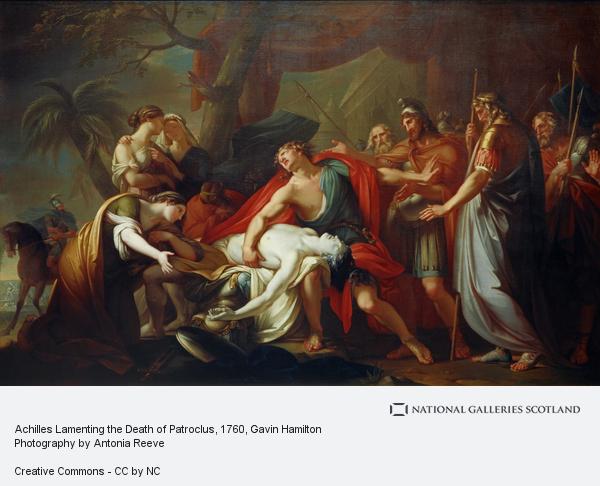 Source: Achilles Lamenting the death of PatroclusAchilles is the main character of The Illiad, which tells the story of the Trojan War and, specifically,
Achilles' wrath. Achilles and Patroclus are lovers and friends; angered by
Agammemnon, Achilles refuses to fight, but allows Patroclus to wear his armor
and lead the Myrmidons against the Trojans. When Patroclus is killed by Hector,
Achilles is grief-stricken and, enraged, he returns to battle to destroy the
Trojans. The image included here, Gavin Hamilton's Achilles
Lamenting the Death of Patroclus (1760-1763), is housed in National Galleries, Scotland. - [TH],
18The grateful tribute of my tears is paid;
19Prone on the shore he feels the pangs of love,
20And stern PelidesPelidesPelidesPelides is Achilles' father; therefore, it is also
another way of referring to Achilles himself. Achilles is frequently described
as "stern" by Homer. - [TH] tend'rest passions move.
21Great Maro's strainMaroMaroPublius Vergilius Maro, more commonly known as Virgil,
the Augustan Roman poet famed for his Eclogues and the epic poem The Aeneid. - [TH] in heav'nly numbers flows,
22The Nine
inspireninenineThe nine muses in Greco-Roman mythology are goddesses,
daughters of Zeus and Mnemosyne who inspire those in the arts and
sciences. - [TH], and all the bosom glows.
23O could I rival thine and Virgil's page,
24Or claim the Muses with the Mantuan SageMantuaMantuaMantua is a city in Italy,
and the home of Virgil; the Mantuan sage is the poet Virgil. - [TH];
25Soon the same beauties should my mind adorn,
26And the same ardors in my soul should burn:
27Then should my song in bolder notes arise,
28And all my numbers pleasingly surprize;
11
29But here I sit, and mourn a grov'ling mind,
30That fainfainfainMeaning "[g]ladly,
willingly, with pleasure," according to the OED (fain, adv.B). - [TH] would
mount, and ride upon the wind.
31Not you, my friend, these plaintive strains become,
32Not you, whose bosom is the Muses home;
33When they from tow'ring HeliconHeliconHeliconMount Helicon in Greece is a mountain believed to be the
home of the muses and hence a place sacred to poetry. - [TH] retire,
34They fan in you the bright immortal fire,
35But I less happy, cannot raise the song,
36The fault'ringfalteringfalteringAn alternate spelling and
contraction, for meter, of "faltering," meaning unsteady or staggering. - [TH]
music dies upon my tongue.
37The happier TerenceTerenceTerencePublius Terentius Afer, better known as
Terence, is a famous Roman comic playwright, born in northern Africa. As the
Encylopedia Britannicanotes, Terence was enslaved and later
freed by a Roman senator. Wheatley suggests a connection between herself and
Terence, both of African origin; yet, Terence is "happier"--both in his poetic
skill, and perhaps also in having been freed. - [TH]*auth1
all the choir inspir'd,
38His soul replenish'd, and his bosom fir'd;
39But say, ye Muses, why this partial grace,
40To one alone of Afric's sable race;
41From age to age transmitting thus his name
42With the first glory in the rolls of fame?
43Thy virtues, great Maecenas! shall be
sung
44In praise of him, from whom those virtues sprung:
12
45While blooming wreaths around thy temples spread,
46I'll snatch a laurellaurellaurel
Source: Achilles Lamenting the death of PatroclusAchilles is the main character of The Illiad, which tells the story of the Trojan War and, specifically,
Achilles' wrath. Achilles and Patroclus are lovers and friends; angered by
Agammemnon, Achilles refuses to fight, but allows Patroclus to wear his armor
and lead the Myrmidons against the Trojans. When Patroclus is killed by Hector,
Achilles is grief-stricken and, enraged, he returns to battle to destroy the
Trojans. The image included here, Gavin Hamilton's Achilles
Lamenting the Death of Patroclus (1760-1763), is housed in National Galleries, Scotland. - [TH],
18The grateful tribute of my tears is paid;
19Prone on the shore he feels the pangs of love,
20And stern PelidesPelidesPelidesPelides is Achilles' father; therefore, it is also
another way of referring to Achilles himself. Achilles is frequently described
as "stern" by Homer. - [TH] tend'rest passions move.
21Great Maro's strainMaroMaroPublius Vergilius Maro, more commonly known as Virgil,
the Augustan Roman poet famed for his Eclogues and the epic poem The Aeneid. - [TH] in heav'nly numbers flows,
22The Nine
inspireninenineThe nine muses in Greco-Roman mythology are goddesses,
daughters of Zeus and Mnemosyne who inspire those in the arts and
sciences. - [TH], and all the bosom glows.
23O could I rival thine and Virgil's page,
24Or claim the Muses with the Mantuan SageMantuaMantuaMantua is a city in Italy,
and the home of Virgil; the Mantuan sage is the poet Virgil. - [TH];
25Soon the same beauties should my mind adorn,
26And the same ardors in my soul should burn:
27Then should my song in bolder notes arise,
28And all my numbers pleasingly surprize;
11
29But here I sit, and mourn a grov'ling mind,
30That fainfainfainMeaning "[g]ladly,
willingly, with pleasure," according to the OED (fain, adv.B). - [TH] would
mount, and ride upon the wind.
31Not you, my friend, these plaintive strains become,
32Not you, whose bosom is the Muses home;
33When they from tow'ring HeliconHeliconHeliconMount Helicon in Greece is a mountain believed to be the
home of the muses and hence a place sacred to poetry. - [TH] retire,
34They fan in you the bright immortal fire,
35But I less happy, cannot raise the song,
36The fault'ringfalteringfalteringAn alternate spelling and
contraction, for meter, of "faltering," meaning unsteady or staggering. - [TH]
music dies upon my tongue.
37The happier TerenceTerenceTerencePublius Terentius Afer, better known as
Terence, is a famous Roman comic playwright, born in northern Africa. As the
Encylopedia Britannicanotes, Terence was enslaved and later
freed by a Roman senator. Wheatley suggests a connection between herself and
Terence, both of African origin; yet, Terence is "happier"--both in his poetic
skill, and perhaps also in having been freed. - [TH]*auth1
all the choir inspir'd,
38His soul replenish'd, and his bosom fir'd;
39But say, ye Muses, why this partial grace,
40To one alone of Afric's sable race;
41From age to age transmitting thus his name
42With the first glory in the rolls of fame?
43Thy virtues, great Maecenas! shall be
sung
44In praise of him, from whom those virtues sprung:
12
45While blooming wreaths around thy temples spread,
46I'll snatch a laurellaurellaurel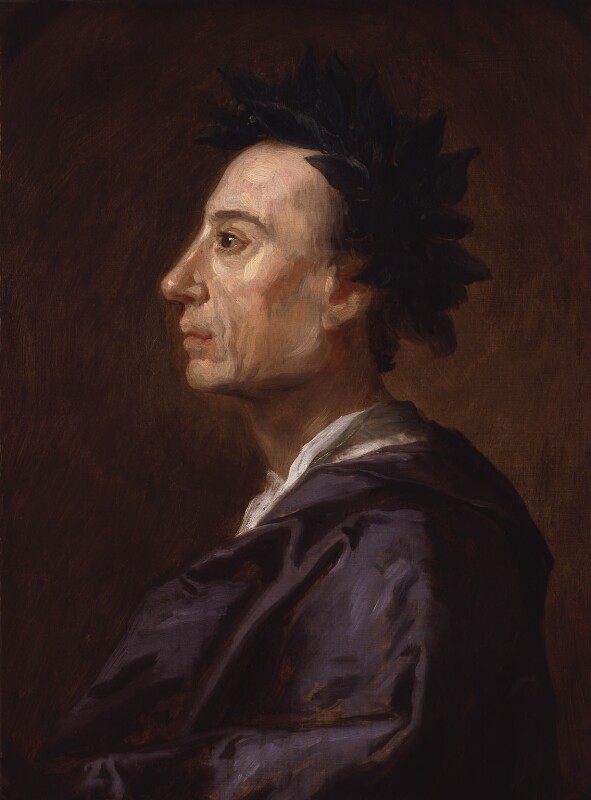 Source: Portrait of Alexander Pope by Jonathan RichardsonThe leaves of the bay laurel tree were a
conventional symbol of poetic fame and acheivement originating in the
mythological tale of Daphne and
Apollo. The image included here is a portrait of the 18th century poet
Alexander Pope, wearing a crown of laurel. The portrait (c.1737), by Jonathan
Richardson, is housed in the National
Portrait Gallery, London. - [TH] from thine honour'd head,
47While you indulgent smile upon the deed.
48As long as ThamesThamesThamesThe Thames is a major river flowing
through southern England and London. - [TH] in streams majestic flows,
49Or NaiadsNaiadsNaiads
Source: Portrait of Alexander Pope by Jonathan RichardsonThe leaves of the bay laurel tree were a
conventional symbol of poetic fame and acheivement originating in the
mythological tale of Daphne and
Apollo. The image included here is a portrait of the 18th century poet
Alexander Pope, wearing a crown of laurel. The portrait (c.1737), by Jonathan
Richardson, is housed in the National
Portrait Gallery, London. - [TH] from thine honour'd head,
47While you indulgent smile upon the deed.
48As long as ThamesThamesThamesThe Thames is a major river flowing
through southern England and London. - [TH] in streams majestic flows,
49Or NaiadsNaiadsNaiads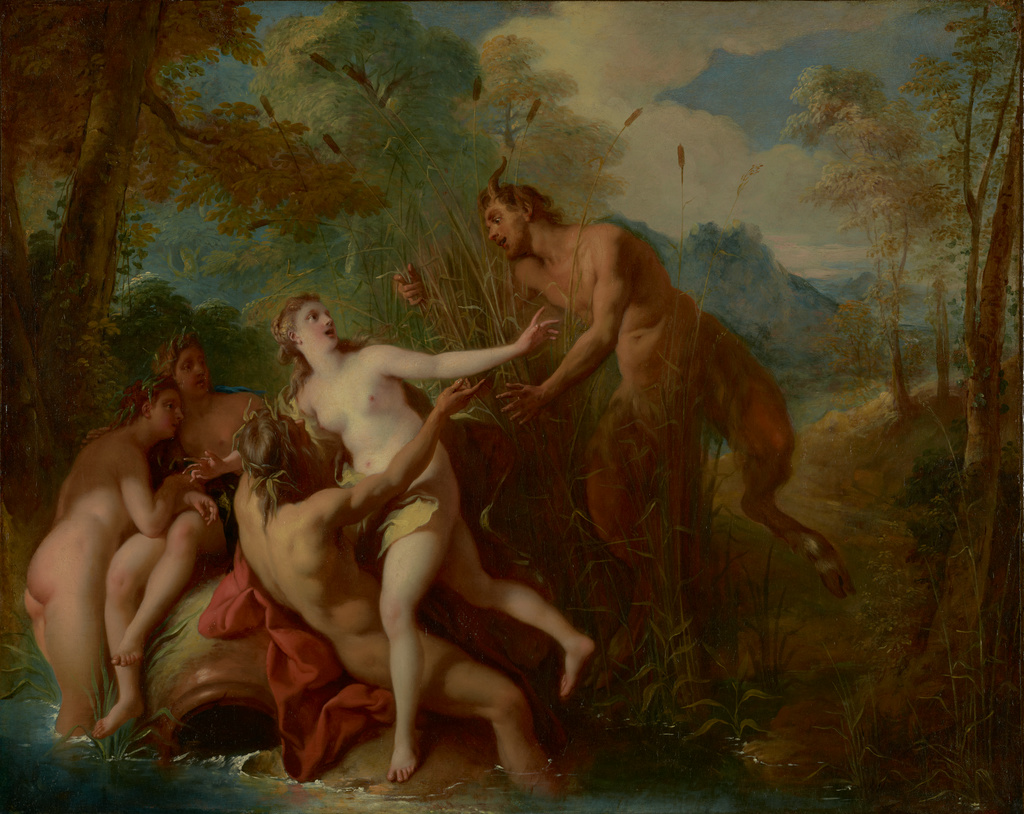 Source: Jean-Francois de Troy, 'Pan and Syrinx' (1722-1724)/>In Greco-Roman
mythology, naiads are female freshwater nymphs. The image included here, by
Jean-Francois de Troy, shows part of the Ovidian story of Pan and Syrinx
(1722-1724). De Troy's Pan and Syrinx is housed in the
Getty Museum. - [TH] in their oozy beds repose
50While PhoebusApolloApolloPhoebus Apollo is an important god in the Greco-Roman
tradition. He is associated with both the sun and with music and poetry. - [TH]
reigns above the starry train,
51While bright AuroraAuroraAuroraIn Greco-Roman mythology, Aurora (called Eos in the
Greek) personifies the dawn. - [TH] purples o'er the main,
52So long, great Sir, the muse thy praise shall sing,
53So long thy praise shall make ParnassusParnassusParnassusParnassus is a mountain in Greece that
was seen as the home of the gods, particularly Dionysus and Apollo, as well as
the Muses. The Muses are also associated with Mount Helicon. - [TH] ring:
54Then grant, Maecenas, thy paternal rays,
55Hear me propitious, and defend my lays.
Source: Jean-Francois de Troy, 'Pan and Syrinx' (1722-1724)/>In Greco-Roman
mythology, naiads are female freshwater nymphs. The image included here, by
Jean-Francois de Troy, shows part of the Ovidian story of Pan and Syrinx
(1722-1724). De Troy's Pan and Syrinx is housed in the
Getty Museum. - [TH] in their oozy beds repose
50While PhoebusApolloApolloPhoebus Apollo is an important god in the Greco-Roman
tradition. He is associated with both the sun and with music and poetry. - [TH]
reigns above the starry train,
51While bright AuroraAuroraAuroraIn Greco-Roman mythology, Aurora (called Eos in the
Greek) personifies the dawn. - [TH] purples o'er the main,
52So long, great Sir, the muse thy praise shall sing,
53So long thy praise shall make ParnassusParnassusParnassusParnassus is a mountain in Greece that
was seen as the home of the gods, particularly Dionysus and Apollo, as well as
the Muses. The Muses are also associated with Mount Helicon. - [TH] ring:
54Then grant, Maecenas, thy paternal rays,
55Hear me propitious, and defend my lays.
 Source: Achilles Lamenting the death of PatroclusAchilles is the main character of The Illiad, which tells the story of the Trojan War and, specifically,
Achilles' wrath. Achilles and Patroclus are lovers and friends; angered by
Agammemnon, Achilles refuses to fight, but allows Patroclus to wear his armor
and lead the Myrmidons against the Trojans. When Patroclus is killed by Hector,
Achilles is grief-stricken and, enraged, he returns to battle to destroy the
Trojans. The image included here, Gavin Hamilton's Achilles
Lamenting the Death of Patroclus (1760-1763), is housed in National Galleries, Scotland. - [TH],
18The grateful tribute of my tears is paid;
19Prone on the shore he feels the pangs of love,
20And stern PelidesPelidesPelidesPelides is Achilles' father; therefore, it is also
another way of referring to Achilles himself. Achilles is frequently described
as "stern" by Homer. - [TH] tend'rest passions move.
21Great Maro's strainMaroMaroPublius Vergilius Maro, more commonly known as Virgil,
the Augustan Roman poet famed for his Eclogues and the epic poem The Aeneid. - [TH] in heav'nly numbers flows,
22The Nine
inspireninenineThe nine muses in Greco-Roman mythology are goddesses,
daughters of Zeus and Mnemosyne who inspire those in the arts and
sciences. - [TH], and all the bosom glows.
23O could I rival thine and Virgil's page,
24Or claim the Muses with the Mantuan SageMantuaMantuaMantua is a city in Italy,
and the home of Virgil; the Mantuan sage is the poet Virgil. - [TH];
25Soon the same beauties should my mind adorn,
26And the same ardors in my soul should burn:
27Then should my song in bolder notes arise,
28And all my numbers pleasingly surprize;
11
29But here I sit, and mourn a grov'ling mind,
30That fainfainfainMeaning "[g]ladly,
willingly, with pleasure," according to the OED (fain, adv.B). - [TH] would
mount, and ride upon the wind.
31Not you, my friend, these plaintive strains become,
32Not you, whose bosom is the Muses home;
33When they from tow'ring HeliconHeliconHeliconMount Helicon in Greece is a mountain believed to be the
home of the muses and hence a place sacred to poetry. - [TH] retire,
34They fan in you the bright immortal fire,
35But I less happy, cannot raise the song,
36The fault'ringfalteringfalteringAn alternate spelling and
contraction, for meter, of "faltering," meaning unsteady or staggering. - [TH]
music dies upon my tongue.
37The happier TerenceTerenceTerencePublius Terentius Afer, better known as
Terence, is a famous Roman comic playwright, born in northern Africa. As the
Encylopedia Britannicanotes, Terence was enslaved and later
freed by a Roman senator. Wheatley suggests a connection between herself and
Terence, both of African origin; yet, Terence is "happier"--both in his poetic
skill, and perhaps also in having been freed. - [TH]*auth1
all the choir inspir'd,
38His soul replenish'd, and his bosom fir'd;
39But say, ye Muses, why this partial grace,
40To one alone of Afric's sable race;
41From age to age transmitting thus his name
42With the first glory in the rolls of fame?
43Thy virtues, great Maecenas! shall be
sung
44In praise of him, from whom those virtues sprung:
12
45While blooming wreaths around thy temples spread,
46I'll snatch a laurellaurellaurel
Source: Achilles Lamenting the death of PatroclusAchilles is the main character of The Illiad, which tells the story of the Trojan War and, specifically,
Achilles' wrath. Achilles and Patroclus are lovers and friends; angered by
Agammemnon, Achilles refuses to fight, but allows Patroclus to wear his armor
and lead the Myrmidons against the Trojans. When Patroclus is killed by Hector,
Achilles is grief-stricken and, enraged, he returns to battle to destroy the
Trojans. The image included here, Gavin Hamilton's Achilles
Lamenting the Death of Patroclus (1760-1763), is housed in National Galleries, Scotland. - [TH],
18The grateful tribute of my tears is paid;
19Prone on the shore he feels the pangs of love,
20And stern PelidesPelidesPelidesPelides is Achilles' father; therefore, it is also
another way of referring to Achilles himself. Achilles is frequently described
as "stern" by Homer. - [TH] tend'rest passions move.
21Great Maro's strainMaroMaroPublius Vergilius Maro, more commonly known as Virgil,
the Augustan Roman poet famed for his Eclogues and the epic poem The Aeneid. - [TH] in heav'nly numbers flows,
22The Nine
inspireninenineThe nine muses in Greco-Roman mythology are goddesses,
daughters of Zeus and Mnemosyne who inspire those in the arts and
sciences. - [TH], and all the bosom glows.
23O could I rival thine and Virgil's page,
24Or claim the Muses with the Mantuan SageMantuaMantuaMantua is a city in Italy,
and the home of Virgil; the Mantuan sage is the poet Virgil. - [TH];
25Soon the same beauties should my mind adorn,
26And the same ardors in my soul should burn:
27Then should my song in bolder notes arise,
28And all my numbers pleasingly surprize;
11
29But here I sit, and mourn a grov'ling mind,
30That fainfainfainMeaning "[g]ladly,
willingly, with pleasure," according to the OED (fain, adv.B). - [TH] would
mount, and ride upon the wind.
31Not you, my friend, these plaintive strains become,
32Not you, whose bosom is the Muses home;
33When they from tow'ring HeliconHeliconHeliconMount Helicon in Greece is a mountain believed to be the
home of the muses and hence a place sacred to poetry. - [TH] retire,
34They fan in you the bright immortal fire,
35But I less happy, cannot raise the song,
36The fault'ringfalteringfalteringAn alternate spelling and
contraction, for meter, of "faltering," meaning unsteady or staggering. - [TH]
music dies upon my tongue.
37The happier TerenceTerenceTerencePublius Terentius Afer, better known as
Terence, is a famous Roman comic playwright, born in northern Africa. As the
Encylopedia Britannicanotes, Terence was enslaved and later
freed by a Roman senator. Wheatley suggests a connection between herself and
Terence, both of African origin; yet, Terence is "happier"--both in his poetic
skill, and perhaps also in having been freed. - [TH]*auth1
all the choir inspir'd,
38His soul replenish'd, and his bosom fir'd;
39But say, ye Muses, why this partial grace,
40To one alone of Afric's sable race;
41From age to age transmitting thus his name
42With the first glory in the rolls of fame?
43Thy virtues, great Maecenas! shall be
sung
44In praise of him, from whom those virtues sprung:
12
45While blooming wreaths around thy temples spread,
46I'll snatch a laurellaurellaurel Source: Portrait of Alexander Pope by Jonathan RichardsonThe leaves of the bay laurel tree were a
conventional symbol of poetic fame and acheivement originating in the
mythological tale of Daphne and
Apollo. The image included here is a portrait of the 18th century poet
Alexander Pope, wearing a crown of laurel. The portrait (c.1737), by Jonathan
Richardson, is housed in the National
Portrait Gallery, London. - [TH] from thine honour'd head,
47While you indulgent smile upon the deed.
48As long as ThamesThamesThamesThe Thames is a major river flowing
through southern England and London. - [TH] in streams majestic flows,
49Or NaiadsNaiadsNaiads
Source: Portrait of Alexander Pope by Jonathan RichardsonThe leaves of the bay laurel tree were a
conventional symbol of poetic fame and acheivement originating in the
mythological tale of Daphne and
Apollo. The image included here is a portrait of the 18th century poet
Alexander Pope, wearing a crown of laurel. The portrait (c.1737), by Jonathan
Richardson, is housed in the National
Portrait Gallery, London. - [TH] from thine honour'd head,
47While you indulgent smile upon the deed.
48As long as ThamesThamesThamesThe Thames is a major river flowing
through southern England and London. - [TH] in streams majestic flows,
49Or NaiadsNaiadsNaiads Source: Jean-Francois de Troy, 'Pan and Syrinx' (1722-1724)/>In Greco-Roman
mythology, naiads are female freshwater nymphs. The image included here, by
Jean-Francois de Troy, shows part of the Ovidian story of Pan and Syrinx
(1722-1724). De Troy's Pan and Syrinx is housed in the
Getty Museum. - [TH] in their oozy beds repose
50While PhoebusApolloApolloPhoebus Apollo is an important god in the Greco-Roman
tradition. He is associated with both the sun and with music and poetry. - [TH]
reigns above the starry train,
51While bright AuroraAuroraAuroraIn Greco-Roman mythology, Aurora (called Eos in the
Greek) personifies the dawn. - [TH] purples o'er the main,
52So long, great Sir, the muse thy praise shall sing,
53So long thy praise shall make ParnassusParnassusParnassusParnassus is a mountain in Greece that
was seen as the home of the gods, particularly Dionysus and Apollo, as well as
the Muses. The Muses are also associated with Mount Helicon. - [TH] ring:
54Then grant, Maecenas, thy paternal rays,
55Hear me propitious, and defend my lays.
Source: Jean-Francois de Troy, 'Pan and Syrinx' (1722-1724)/>In Greco-Roman
mythology, naiads are female freshwater nymphs. The image included here, by
Jean-Francois de Troy, shows part of the Ovidian story of Pan and Syrinx
(1722-1724). De Troy's Pan and Syrinx is housed in the
Getty Museum. - [TH] in their oozy beds repose
50While PhoebusApolloApolloPhoebus Apollo is an important god in the Greco-Roman
tradition. He is associated with both the sun and with music and poetry. - [TH]
reigns above the starry train,
51While bright AuroraAuroraAuroraIn Greco-Roman mythology, Aurora (called Eos in the
Greek) personifies the dawn. - [TH] purples o'er the main,
52So long, great Sir, the muse thy praise shall sing,
53So long thy praise shall make ParnassusParnassusParnassusParnassus is a mountain in Greece that
was seen as the home of the gods, particularly Dionysus and Apollo, as well as
the Muses. The Muses are also associated with Mount Helicon. - [TH] ring:
54Then grant, Maecenas, thy paternal rays,
55Hear me propitious, and defend my lays.
Footnotes
_Maecenas Source: page from first edition of Wheatley's poemsMaecenas was the wealthy patron of classical Roman
poets Virgil and Horace, whom Wheatley draws on in complex ways. Wheatley's
poem "To Maecenas" opens her collection, which position gives it a powerful
significance as she claims the right to speak within this tradition. Like Horace's Odes to Maecenas, Wheatley's offers praise to her patron,
but does so in ways that are fraught with the equivocalities of being an
enslaved African working within the languge and culture of the colonial master. For a deeper
reading of "To Maecenas," see Paula Bennett's journal article, "Phillis
Wheatley's Vocation and the Paradox of the 'Afric Muse.'" Following other
scholars, Bennett identifies Wheatley's poet-patron as Mather Byles, one of the
signatories verifying her authorship. The image included here shows the
attestation to the public, included in the 1773 edition of Wheatley's poems,
certifying that they were indeed written by "PHILLIS, a young Negro Girl, who
was but a few Years since, brought an uncultivated Barbarian from Africa,...and now is, under the Disadvantage of serving
as a Slave in a Family in [Boston]." Note Bales' name.
Source: page from first edition of Wheatley's poemsMaecenas was the wealthy patron of classical Roman
poets Virgil and Horace, whom Wheatley draws on in complex ways. Wheatley's
poem "To Maecenas" opens her collection, which position gives it a powerful
significance as she claims the right to speak within this tradition. Like Horace's Odes to Maecenas, Wheatley's offers praise to her patron,
but does so in ways that are fraught with the equivocalities of being an
enslaved African working within the languge and culture of the colonial master. For a deeper
reading of "To Maecenas," see Paula Bennett's journal article, "Phillis
Wheatley's Vocation and the Paradox of the 'Afric Muse.'" Following other
scholars, Bennett identifies Wheatley's poet-patron as Mather Byles, one of the
signatories verifying her authorship. The image included here shows the
attestation to the public, included in the 1773 edition of Wheatley's poems,
certifying that they were indeed written by "PHILLIS, a young Negro Girl, who
was but a few Years since, brought an uncultivated Barbarian from Africa,...and now is, under the Disadvantage of serving
as a Slave in a Family in [Boston]." Note Bales' name.
_HomerHomer is the ancient Greek poet of The
Oddyssey and The Illiad.
_Patroclus Source: Achilles Lamenting the death of PatroclusAchilles is the main character of The Illiad, which tells the story of the Trojan War and, specifically,
Achilles' wrath. Achilles and Patroclus are lovers and friends; angered by
Agammemnon, Achilles refuses to fight, but allows Patroclus to wear his armor
and lead the Myrmidons against the Trojans. When Patroclus is killed by Hector,
Achilles is grief-stricken and, enraged, he returns to battle to destroy the
Trojans. The image included here, Gavin Hamilton's Achilles
Lamenting the Death of Patroclus (1760-1763), is housed in National Galleries, Scotland.
Source: Achilles Lamenting the death of PatroclusAchilles is the main character of The Illiad, which tells the story of the Trojan War and, specifically,
Achilles' wrath. Achilles and Patroclus are lovers and friends; angered by
Agammemnon, Achilles refuses to fight, but allows Patroclus to wear his armor
and lead the Myrmidons against the Trojans. When Patroclus is killed by Hector,
Achilles is grief-stricken and, enraged, he returns to battle to destroy the
Trojans. The image included here, Gavin Hamilton's Achilles
Lamenting the Death of Patroclus (1760-1763), is housed in National Galleries, Scotland.
 Source: Achilles Lamenting the death of PatroclusAchilles is the main character of The Illiad, which tells the story of the Trojan War and, specifically,
Achilles' wrath. Achilles and Patroclus are lovers and friends; angered by
Agammemnon, Achilles refuses to fight, but allows Patroclus to wear his armor
and lead the Myrmidons against the Trojans. When Patroclus is killed by Hector,
Achilles is grief-stricken and, enraged, he returns to battle to destroy the
Trojans. The image included here, Gavin Hamilton's Achilles
Lamenting the Death of Patroclus (1760-1763), is housed in National Galleries, Scotland.
Source: Achilles Lamenting the death of PatroclusAchilles is the main character of The Illiad, which tells the story of the Trojan War and, specifically,
Achilles' wrath. Achilles and Patroclus are lovers and friends; angered by
Agammemnon, Achilles refuses to fight, but allows Patroclus to wear his armor
and lead the Myrmidons against the Trojans. When Patroclus is killed by Hector,
Achilles is grief-stricken and, enraged, he returns to battle to destroy the
Trojans. The image included here, Gavin Hamilton's Achilles
Lamenting the Death of Patroclus (1760-1763), is housed in National Galleries, Scotland._PelidesPelides is Achilles' father; therefore, it is also
another way of referring to Achilles himself. Achilles is frequently described
as "stern" by Homer.
_MaroPublius Vergilius Maro, more commonly known as Virgil,
the Augustan Roman poet famed for his Eclogues and the epic poem The Aeneid.
_nineThe nine muses in Greco-Roman mythology are goddesses,
daughters of Zeus and Mnemosyne who inspire those in the arts and
sciences.
_MantuaMantua is a city in Italy,
and the home of Virgil; the Mantuan sage is the poet Virgil.
_fainMeaning "[g]ladly,
willingly, with pleasure," according to the OED (fain, adv.B).
_HeliconMount Helicon in Greece is a mountain believed to be the
home of the muses and hence a place sacred to poetry.
_falteringAn alternate spelling and
contraction, for meter, of "faltering," meaning unsteady or staggering.
_TerencePublius Terentius Afer, better known as
Terence, is a famous Roman comic playwright, born in northern Africa. As the
Encylopedia Britannicanotes, Terence was enslaved and later
freed by a Roman senator. Wheatley suggests a connection between herself and
Terence, both of African origin; yet, Terence is "happier"--both in his poetic
skill, and perhaps also in having been freed.
_laurel Source: Portrait of Alexander Pope by Jonathan RichardsonThe leaves of the bay laurel tree were a
conventional symbol of poetic fame and acheivement originating in the
mythological tale of Daphne and
Apollo. The image included here is a portrait of the 18th century poet
Alexander Pope, wearing a crown of laurel. The portrait (c.1737), by Jonathan
Richardson, is housed in the National
Portrait Gallery, London.
Source: Portrait of Alexander Pope by Jonathan RichardsonThe leaves of the bay laurel tree were a
conventional symbol of poetic fame and acheivement originating in the
mythological tale of Daphne and
Apollo. The image included here is a portrait of the 18th century poet
Alexander Pope, wearing a crown of laurel. The portrait (c.1737), by Jonathan
Richardson, is housed in the National
Portrait Gallery, London.
 Source: Portrait of Alexander Pope by Jonathan RichardsonThe leaves of the bay laurel tree were a
conventional symbol of poetic fame and acheivement originating in the
mythological tale of Daphne and
Apollo. The image included here is a portrait of the 18th century poet
Alexander Pope, wearing a crown of laurel. The portrait (c.1737), by Jonathan
Richardson, is housed in the National
Portrait Gallery, London.
Source: Portrait of Alexander Pope by Jonathan RichardsonThe leaves of the bay laurel tree were a
conventional symbol of poetic fame and acheivement originating in the
mythological tale of Daphne and
Apollo. The image included here is a portrait of the 18th century poet
Alexander Pope, wearing a crown of laurel. The portrait (c.1737), by Jonathan
Richardson, is housed in the National
Portrait Gallery, London._ThamesThe Thames is a major river flowing
through southern England and London.
_Naiads Source: Jean-Francois de Troy, 'Pan and Syrinx' (1722-1724)/>In Greco-Roman
mythology, naiads are female freshwater nymphs. The image included here, by
Jean-Francois de Troy, shows part of the Ovidian story of Pan and Syrinx
(1722-1724). De Troy's Pan and Syrinx is housed in the
Getty Museum.
Source: Jean-Francois de Troy, 'Pan and Syrinx' (1722-1724)/>In Greco-Roman
mythology, naiads are female freshwater nymphs. The image included here, by
Jean-Francois de Troy, shows part of the Ovidian story of Pan and Syrinx
(1722-1724). De Troy's Pan and Syrinx is housed in the
Getty Museum.
 Source: Jean-Francois de Troy, 'Pan and Syrinx' (1722-1724)/>In Greco-Roman
mythology, naiads are female freshwater nymphs. The image included here, by
Jean-Francois de Troy, shows part of the Ovidian story of Pan and Syrinx
(1722-1724). De Troy's Pan and Syrinx is housed in the
Getty Museum.
Source: Jean-Francois de Troy, 'Pan and Syrinx' (1722-1724)/>In Greco-Roman
mythology, naiads are female freshwater nymphs. The image included here, by
Jean-Francois de Troy, shows part of the Ovidian story of Pan and Syrinx
(1722-1724). De Troy's Pan and Syrinx is housed in the
Getty Museum. _ApolloPhoebus Apollo is an important god in the Greco-Roman
tradition. He is associated with both the sun and with music and poetry.
_AuroraIn Greco-Roman mythology, Aurora (called Eos in the
Greek) personifies the dawn.
_ParnassusParnassus is a mountain in Greece that
was seen as the home of the gods, particularly Dionysus and Apollo, as well as
the Muses. The Muses are also associated with Mount Helicon.
